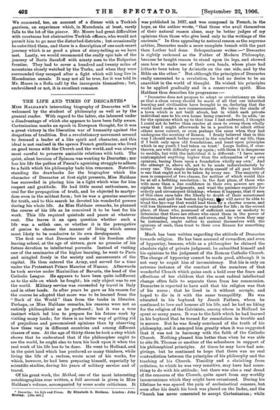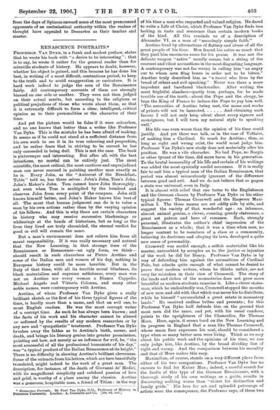THE LIFE AND TIMES OF DESCARTES.*
Miss HALDANE'S interesting biography of Descartes will be welcomed by the student of philosophy as well as by the general reader. With regard to the latter, she laboured under a disadvantage of which she appears to have been fully aware. Cartssianism marks an epoch in European thought, for it was a great victory in the liberation war of humanity against the despotism of tradition. But a revolutionary movement seemed to demand a leader of a like spirit and character, and this ideal is not realised in the spruce French gentleman who lived on good terms with the Church and the world, and was always most careful to preserve amicable relations with both. The quiet, silent heroism of Spinoza was wanting to Descartes ; nor has his life the pathos of Pascal's agonising struggle to adhere to a faith which his philosophy bade him renounce. Notwith- standing the drawbacks for the biographer which the character of Descartes at first sight presents, Miss Haldane has succeeded in placing him in a light which wins for him respect and gratitude. He had little moral enthusiasm, no zeal for the propagation of truth, and he objected to martyr- dom even in the mildest form ; but he was a genuine searcher for truth, and to this search he devoted his wonderful powers during his whole life. As Miss Haldane remarks, he planned the course of his life as he conceived it to be best for his work. This life required quietude and peace at whatever cost. She leaves it an open question whether such a life was a selfish one, or whether it is the prerogative of genius to choose the manner of living which seems most likely to be conducive to its own development.
The first use that Descartes made of his freedom after leaving school, at the age of sixteen, gave no promise of his future devotion to intellectual pursuits. Instead of visiting one of the seminaries of the higher learning, he went to Paris and mingled freely in the society and amusements of the capitaL He then entered the Army, and served for a time under the Protestant Prince Maurice of Nassau. Afterwards he took service under Maximilian of Bavaria, the head of the Catholic League. He appears to have been quite indifferent as to the side on which he fought; his only object was to see the world. Military service was succeeded by travel in Italy and in other lands. In after years he gave as his reason for the course he adopted that more was to be learned from the "Book of the World" than from the books in libraries. Perhaps, as Miss Haldane remarks, his reasons were not so entirely philosophical as he professed ; but it was a true instinct which led him to prepare for his future work by visiting many lands ; for there is no better way of getting rid of prejudices and preconceived opinions than by observing how these vary in different countries and among different classes of men. At the age of thirty-three he took a step which shows that he understood that if the philosopher ought to see the world, he ought also to turn his back upon it when the real work of his life has to be done. He went to Holland, and in the quiet land which has produced so many thinkers, while living the life of a recluse, wrote most of his works, for which, however, he had been preparing himself, especially by scientific studies, during his years of military service and of travel.
Of his great work, the Method, one of the most interesting autobiographies ever written, a full account is given in Miss Haldane's volume, accompanied by some acute criticisms. It
Descartes: his Life and Times. By Elisabeth S. Haldane. London: John Num/. [15e. net.]
was published in 1637, and was composed in French, in the hope, as the author wrote, "that those who avail themselves of their natural reason alone, may be better judges of my opinions than those who give heed only to the writings of the ancients." In thus appealing to natural reason as the supreme arbiter, Descartes made a more complete breach with the past than Luther had done. Schopenhauer writes :—" Descartes is rightly reckoned as the Father of Modern Philosophy, because he taught reason to stand upon its legs, and showed men how to make use of their own heads, whose place had hitherto been taken by Aristotle on the one side, and by the Bible on the other." But although the principles of Descartes really amounted to a revolution, he had no desire to be an anarchist in the world of thought. He wished his principles to be applied gradually and in a conservative spirit. Miss Haldane thus describes his programme :—
" Descartes does not propose to adopt so revolutionary an idea as that a clean sweep should be made of all that our inherited learning and civilization have brought to us, declaring that the world must make a new commencement. He takes the simile of a town which is not built afresh, but in which each private individual sees to his own house being renewed. So he adds, as for the opinions which up to that time I had embraced, I thought I could not do better than resolve at once to sweep them wholly away that I might afterwards be in a position to admit either others more correct, or even perhaps the same when they had undergone the scrutiny of Reason. I firmly believed that in this way I should much better succeed in the conduct of my life, than if I built only upon old foundations, and leant upon principles which in my youth I had taken on trust.' Large bodies, if over- thrown, are with difficulty set up again ; with them it is dangerous to meddle, but with the individual it is different: 'I have never contemplated anything higher than the reformation of my own opinions, basing them upon a foundation wholly my own.' And the attempt is, above all, not to be made indiscriminately by every one. The single design to strip oneself of all past beliefs is one that ought not to be taken by every one. The majority of men is composed of two classes, for neither of which would this be at all a befitting resolution : in the first place, of those who with more than a due confidence in their own powers are pre- cipitate in their judgments, and want the patience requisite for orderly and circumspect thinking; whence it happens, that if men of this class once take the liberty to doubt of their accustomed opinions, and quit the beaten highway, apy will never be able to tread the bye-way that would lead theml5y a shorter course, and will lose themselves and continue to wander for life ; in the second place, of those who, possessed of sufficient sense or modesty to determine that there are others who excel them in the power of discriminating between truth and error, and by whom they may be instructed, ought rather to content themselves with the opinions of such, than trust to their own Reason for something better."
Much has been written regarding the attitude of Descartes towards religion. He has been accused of cowardice, and even of hypocrisy, because, while as a philosopher he claimed the absolute right of private judgment, he submitted himself and his opinions to the judgment of the Rom an Catholic Church. The charge of hypocrisy cannot be made good, although it is not easy to acquit him of inconsistency. But his is only an extreme instance of the conduct of the members of that wonderful Chuich which gains such a hold over the fears and affections of her children that the most radical intellectual change often fails to separate them from her communion.
Descartes is reported to have said that his religion was that of his nurse ; that he lived in it without scruple, and hoped to die in it with the same tranquillity. He was educated in his boyhood, by Jesuit Fathers, whom he continued to love and honour all his life, and he had no liking
for the religion of the Calvinists, among whom in Rolland he spent so many years. It was to the faith which he had learned
in his boyhood that he turned for consolation in trouble and in sorrow. But he was firmly convinced of the truth of his philosophy, and it annoyed him greatly when it was suggested that it was not in harmony with the faith of the Catholic Church. Nothing pleased him better than when he was able to cite St. Thomas or another of the schoolmen in support of his philosophical principles. At times he may have had mis- givings, but he continued to hope that there was no real contradiction between the principles of his philosoph7 and the teaching of his Church. Timidity and a shrinking from criticism, to which he was verrsensitive, may have had some- thing to do with his attitude; but there was also a real dread
of the censures of the Church, quite apart from any worldly inconvenience which they might have occasioned. During his lifetime he was spared the pain of ecclesiastical censure, but soon after his death his book was placed on the Index, and the nhurch has never consented to accept Cartesianism ; while
from the days of Spinoza onward some of the most pronounced opponents of an ecclesiastical authority within the realms of thought have appealed to Descartes as their teacher and master.







































 Previous page
Previous page